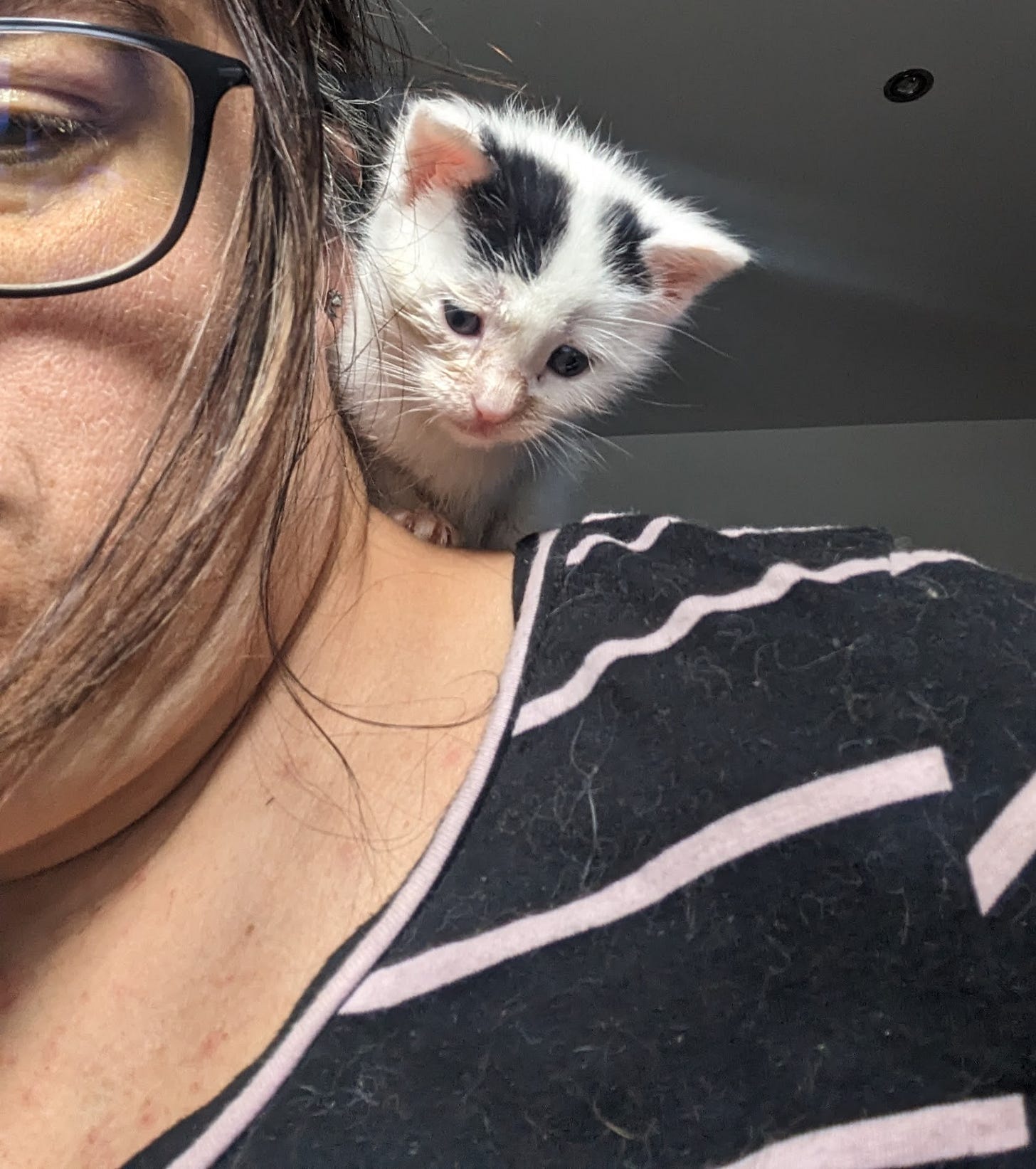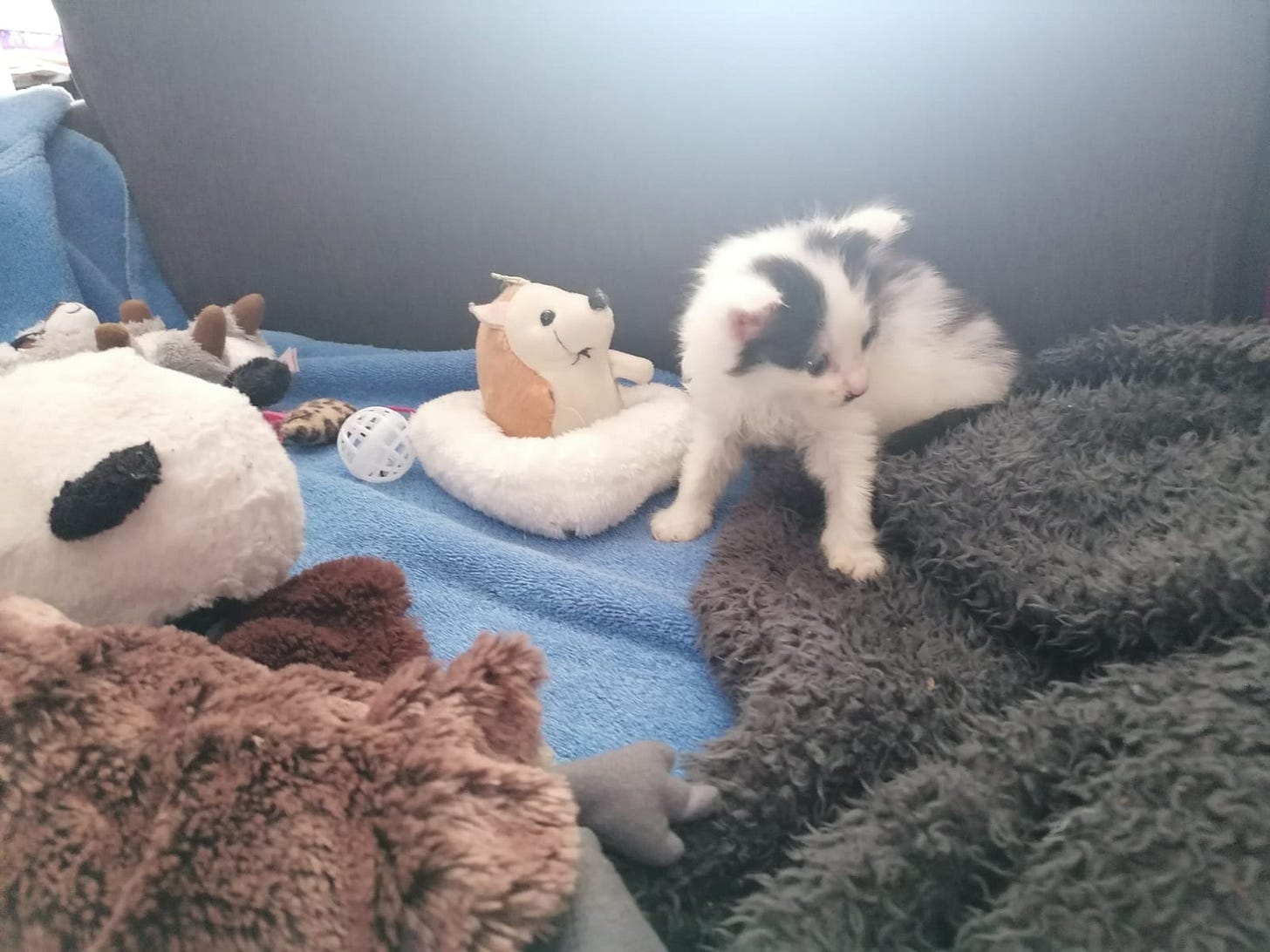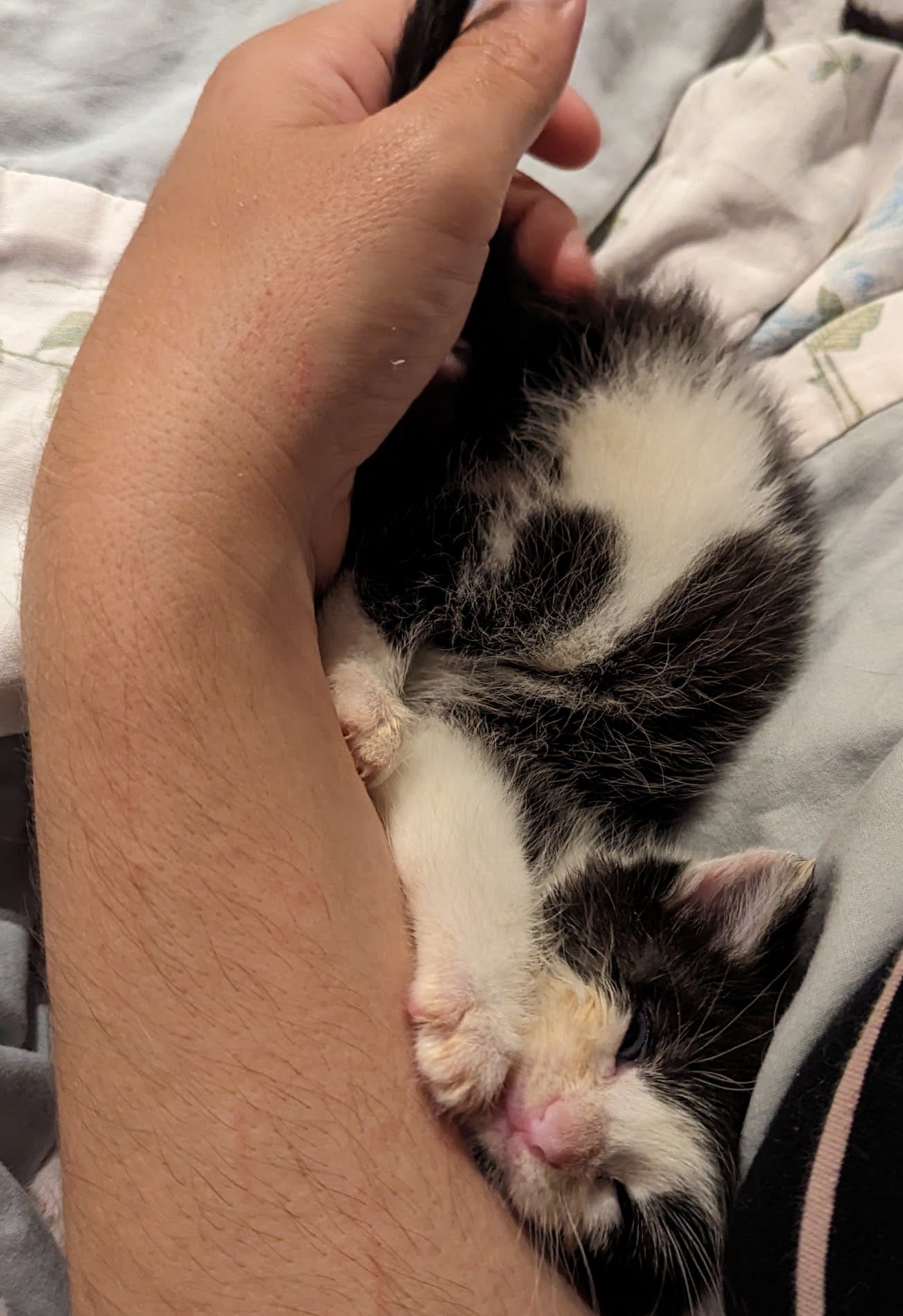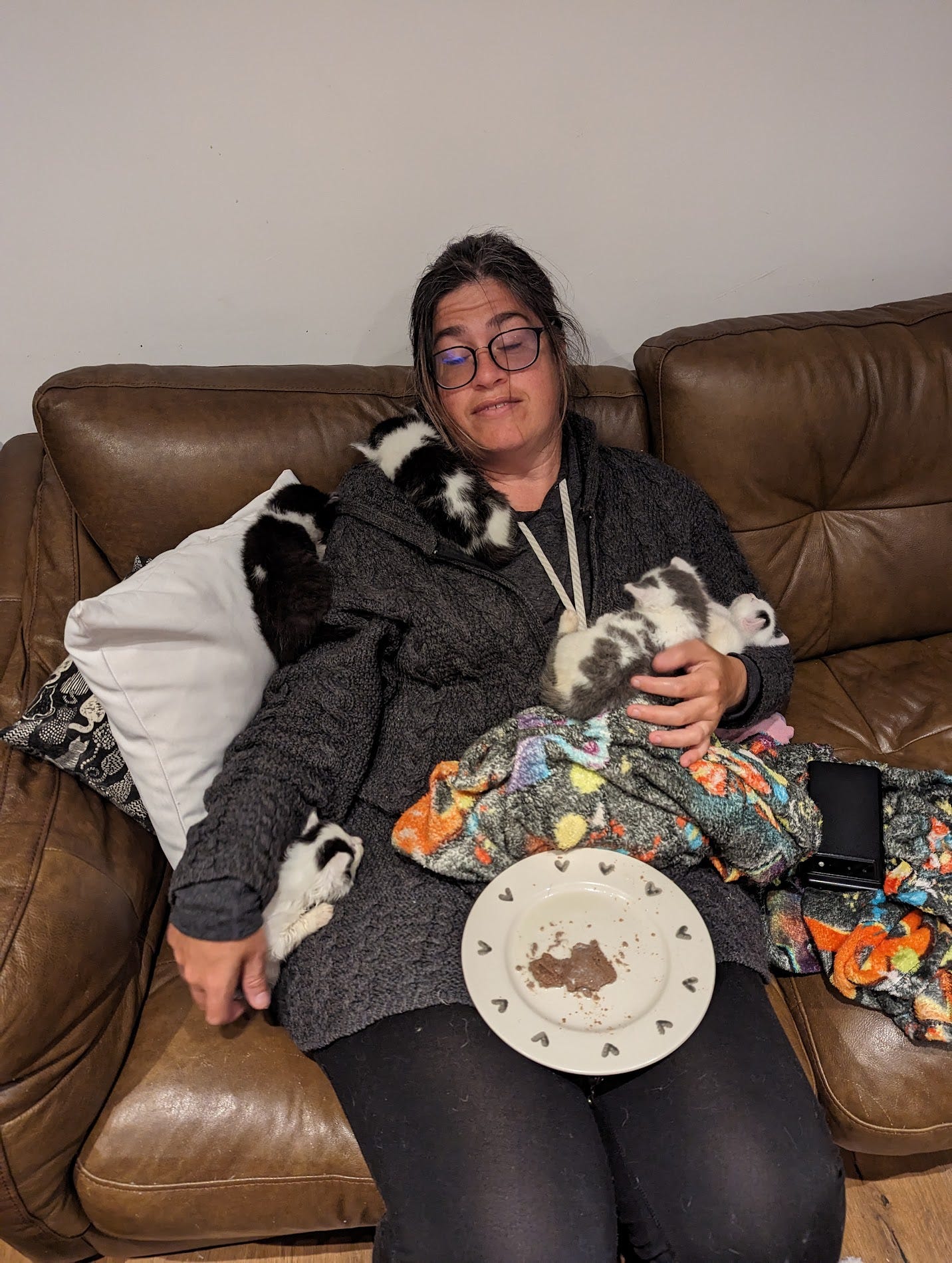Kittens
On fostering, acknowledging our weaknesses, and a reminder to myself about why I keep doing it
This post is not about data protection. It does, however, have lots of adorable kitten pictures in it, and a bonus video.
In my off-hours, I volunteer as a fosterer with a wonderful animal rescue group, the Liffey Cat Club, here in Dublin. They’re a great group of tireless volunteers who take in and foster cats and kittens in need of forever homes. I’ve been with them since they were founded in 2021, and have fostered something like 12 litters with them (and another 15 or 20 so with other charities since 2013). I also have six cats of my own, which means that I am basically the Crazy Cat Lady from the Simpsons:
Since I’ve been fostering for a decade, I’ve gotten reasonably good at it, and that means I tend to get the harder cases. Feral, very spicy mommas. Kittens with ringworm (so much ringworm!), Kittens that can’t poop or poop too much. Kittens with health issues. Borderline, semi-feral or antisocial cases that need lots of socialization. Oh, and occasionally, bottle babies.

Bottle babies are orphaned kittens, sometimes only days or even hours old. They’re the toughest to foster because they are the most dependent on us giant hairless gorilla-pigs. Just like human babies, kittens under about 4-5 weeks of age are incapable of survival without constant intervention.

Kittens (up to about 3-4 weeks) cannot regulate their body temperature, so they need to be constantly kept warm. They don’t know how to relieve themselves, which means you need to stimulate them to do so (wiping a wet cloth on the bum & bits is usually all it takes). They are blind and deaf, totally defenseless, and need to be fed every few hours by bottle. Many kittens struggle with bottles, and this makes the whole process exhausting, frustrating, and a sometimes soul-destroy exercise for us humans. It’s also easy to get wrong — if you try feeding a kitten too quickly, or you hold them the wrong way, or if they have a cleft palate, they can aspirate, and that is often fatal. Oh, and due to weak immune systems (especially if they’re abandoned early by mom before they get her immune-boosting colostrum), they’re prone to catching various viral and bacterial infections or suffering from ‘fading kitten syndrome’ — aka, failure to thrive.
I personally hate taking bottle babies, and avoid the task as much as possible. I suck at it and no matter how many Kitten Lady tutorials I’ve watched, I still continue to do it badly. Partly, this is because I have zero maternal instinct or the patience necessary to slowly and gently coax a completely dependent living creature into doing something I want. It stresses me out, and I am almost certain that stress comes across to the kittens. I’m not abusive in any way, but after the 20th failed attempt to get the kitten to suckle (and running on 4 hours of broken sleep), I do tense up. I’m sure that the quiet sobbing and (not so quiet) swearing at myself, also doesn’t help create an atmosphere of calm.

I Am a Stupid Idiot, But the Kittens are Worth It
July and August are still prime kitten months. It’s also prime vacation / fucking off / leaving the country season here in Ireland, which means fosterer numbers are low. I have a trip planned, and despite this obvious fact (which would have convinced a smarter person to just say no), I agreed to watch five four-week-old bottle babies, provided they could be handed over before I left. I stupidly ignored the fact that fosterer numbers were low, and that the poor coordinators were already struggling with a larger-than-average number of cats & kittens.

So, for the past week, I’ve had two constant stresses — finicky, but adorably sweet bottle babies I’ve desperately been trying to wean, and no guarantee until very, very recently, that I’d have coverage and still be able to go on my trip. It’s been a rough week. I’m exhausted. I still hate taking care of bottle babies, and I’m still terrible at it. But there is some good news: the folks at the Liffey Cat Club continue to be amazing, and I was fortunate enough to take care of five of the sweetest, most adorable floofs that have probably ever existed in all of catdom.
These kittens, by the way, have a rather inspired story. I was the fourth person (in as many weeks) tasked with caring for them. The first kind-natured soul was a Ukrainian refugee, housed in one of Dublin’s many resettlement hotels. She discovered the kittens had been abandoned, and smuggled them into her hotel room, where she tirelessly cared for them until she was caught and had to surrender them into care.

These kittens have received a lot of love in their short lives, and I have no doubt they will continue to be loved as they find their forever homes. In the grand scheme of things, my momentary week of stress will be forgotten. They won’t remember me (no matter how much I secretly wish they would), but I will remember them. In time, I will also remind myself that even though I’m a terrible bottle-feeder and a massive ball of stress not fit to be around neonates, I still managed to do some small bit of good for those kittens. And one day soon, they will be adopted and brought into loving homes, where each of them will bring joy and comfort to an untold number of people for years.
This is why I keep fostering, despite the stress and anxiety of doing it wrong. This post is as much a reminder to myself of that fact, now that I’m not living in a cortisol-induced state of panic about the fate of the kittens. Keep fostering, you stupid idiot.
(The idiot here, btw, is me. But if you also want to do a good deed for the universe, you should find a local foster or TNR — trap, neuter, release — group and volunteer yourself. The kittens will appreciate it, at least until they get distracted by a speck of dust on the wall).

And here’s a bonus cat video of Beaker that I took a few hours before he was handed over to another cat-saint in human form. Ah, the joys and struggles of being a kitten.

